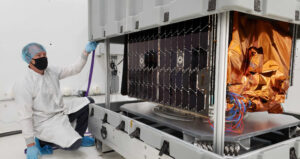It means San Francisco-based Astranis has raised more than $350 million to expand its microsatellite platform, following a $90 million debt and equity round in February 2020.
At around 350 kilograms, the venture is developing one of the smallest geostationary spacecraft in the commercial industry.
Astranis is focusing on the affordable broadband market. One of its first customers is U.S.-based Pacific Dataport, which will lease the 7.5 gigabits per second capacity on its first commercial satellite for internet services across Alaska.
“We already had the funding in hand to start service with our first commercial satellite, the satellite we’re launching later this year for Alaska,” Astranis co-founder and CEO John Gedmark told SpaceNews.
“This additional capital allows us to scale up our production capabilities, including a new facility where we can build dozens and then hundreds of satellites.”
Astranis will use proceeds to accelerate research and development for next-generation platforms. These include software-defined radio technology that it says improves satellite performance and flexibility, ultimately lowering price points for end-consumers because spacecraft can be built more easily at scale.
The company also wants to expand beyond using Ka-band spectrum to higher frequency Q- and V-band, which are largely unused.
Other new investors in the company apart from BlackRock include Baillie Gifford, Fidelity Management & Research Company, Koch Strategic Platforms, Monashee Investment Management and Uncorrelated Ventures.
They joined existing investors that also participated in the Series C round, including Andreessen Horowitz, Venrock, Fifty Years, ACE Early Stage Partners, Harpoon Ventures, Indicator Fund, Industry Ventures, Jaan Tallinn, Jeff Dean, Jerry Yang’s AME Cloud, Jude Gomila, Refactor Capital, Rising Tide Fund and SOMA Capital.



